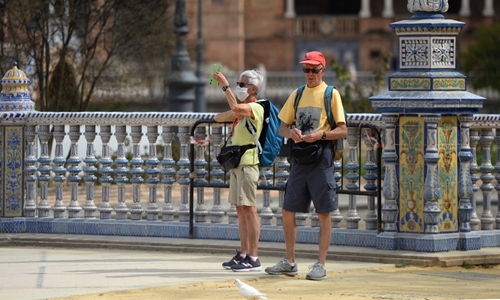Coronavirus dilemma for Chinese in Spain: stay or leave
By Wan Lin and Zhao Yusha Source:Globaltimes.cn Published: 2020/3/12 1:46:01

A tourist wearing a protective mask takes a picture at Plaza ESpana in Seville, on March 11, 2020 Photo: AFP
As coronavirus cases in Spain rocketed to 2,000 and the disease spread across Europe, Chinese people in Spain are struggling with a tough decision about whether to return to China or stay, while facing a belated epidemic control in Spain and otherwise complicated procedures if returning.
Spain has stepped up epidemic preventions and controls as confirmed cases jumped to 2,067 across the country as of Wednesday, tenfold in a week.
The government has canceled flights to and from Italy and imposed stricter measures in Madrid and most other affected regions, including announcing a temporary suspension of educational institutions, ordering sports events to be played in empty venues and calling off other large-scale gathering activities.
The preventive responses were considered lax and belated by some Chinese living in Spain, who worried that Spain is about to become the next Italy if it doesn't take stricter measures.
"Despite the government starting to make efforts to contain the virus, people in Spain are complacent; they still wander around without masks on, continue hugging and kissing like nothing has happened," Zhao Xiaoyu, a Chinese who currently works in Barcelona told the Global Times.
Zhao said that in her residential building, she even saw flyers "actually selling the virus for 60 euros to trade for 15 free days with family and friends."
"They promise that one will definitely be infected by the virus if they give 60 euros. It's a prank, I wish; but also reflects that for many Spaniards, the virus, the deadly virus is a joke for them," said Zhao.
Having been closely following China's fast-spreading epidemic situation in the past one and a half months, many Chinese in Spain see it more seriously and take more cautious preventive actions than other people who treat the coronavirus as a common flu.
Xiao Chao, a 30-year-old who works in a Chinese restaurant in Barcelona, told the Global Times that most of the Chinese-owned restaurants in the city have shut down as the disease spreads, while other western restaurants still stay open and seem not to worry too much.
Whether to wear masks in public or not is another difference between the Chinese and Spaniards.
Most Chinese believe that wearing masks is a major way to protect against the virus, but Spaniards tend to have an opposite preference, Jin Rong, a Chinese teacher who has lived in Spain for 10 years, told the Global Times on Wednesday. That sentiment was echoed by other Chinese who have experienced being discouraged in the public when wearing a mask.
"Some people would stay away from me or stare at me in a weird way when I wear a mask," said a Chinese student, surnamed Yang, at University of Barcelona. "One day a stranger asked me on the street if I was sick. I told him that I wear a mask just because I had a burn scar on my face - it's bad to feel like the odd man out."
Though some Spaniards seem to react less cautiously to the virus, a survey conducted by Spanish newspaper La Vanguardia showed that 87 percent of respondents expressed concerns over the spread of the coronavirus. A total of 218,279 readers took the survey online as of press time on Wednesday.
The rising anxiety among the public and the rapidly worsening epidemic situation in Spain has made many Chinese feel eager to go back to China for periodic protection.
"The epidemic has been slowly getting under control in China but it's the opposite here in Spain. My friends and I are discussing whether to leave or stay almost every day," Dabo, a first-year student at University of Zaragoza, told the Global Times on Tuesday. "It's not only us; a lot of Chinese students here are actively considering going back to China and staying home until the situation gets better."
A major challenge that hinders them in leaving is worries about grades and credits if they have to apply for school suspension, he noted. Currently, only schools in Madrid and other most affected areas have been suspended.
Complicated procedures for travel to and from China also affect people's decisions as the necessary documents need to be submitted to schools and relevant parties to ensure smooth to and from travel, which might take as long as one month, according to Dabo.
Some people instead choose to not go as they believe there might be higher risks of getting infection during the trip and they don't want to bring risks to their families in China.
"I thought about it before but as the epidemic worsened, I changed my mind," Wen Wen, a 32-year-old restaurant owner in Barcelona, also a mother of two 5-month-old babies, told the Global Times on Monday. "Staying home now is the safest option for the whole family."
She added that many of her friends have already gone back to China because they think China is doing a relatively better job at preventing and controlling the epidemic. "They went directly to designated hotels for quarantine after they arrived home," she noted.
As of Wednesday, China reported five imported case from Spain, including two newly confirmed cases in South China's Guangdong Province, both of whom had traveled back from Valencia.